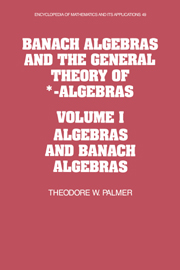Book contents
- Frontmatter
- Preface
- Ernest Jesse Palmer (April 8, 1875 to February 25, 1962)
- Contents
- Tentative Contents of Volume II
- 1 Introduction to Normed Algebras; Examples
- 2 The Spectrum
- 3 Commutative Algebras and Functional Calculus
- 4 Ideals, Representations and Radicals
- 5 Approximate Identities and Factorization
- 6 Automatic Continuity
- 7 Structure Spaces
- 8 Algebras with Minimal Ideals
- Bibliography
- Index
- Symbol Index
3 - Commutative Algebras and Functional Calculus
Published online by Cambridge University Press: 05 May 2013
- Frontmatter
- Preface
- Ernest Jesse Palmer (April 8, 1875 to February 25, 1962)
- Contents
- Tentative Contents of Volume II
- 1 Introduction to Normed Algebras; Examples
- 2 The Spectrum
- 3 Commutative Algebras and Functional Calculus
- 4 Ideals, Representations and Radicals
- 5 Approximate Identities and Factorization
- 6 Automatic Continuity
- 7 Structure Spaces
- 8 Algebras with Minimal Ideals
- Bibliography
- Index
- Symbol Index
Summary
Introduction
In this work we are relatively little concerned with commutative algebras. The involution in the *-algebras, which are the main subject of study here, is a sort of weak substitute for commutativity. However, some commutative theory is essential in dealing with the more complicated non-commutative theory. In particular, commutativity is intimately associated with the various functional calculi which we will introduce in this chapter and later.
Section 3.1 presents the remarkably simple theory, created by Israel Moiseevič Gelfand [1941a], which replaces any commutative Banach algebra by a homomorphic image (modulo its Jacobson radical) which is an algebra of complex-valued continuous functions vanishing at infinity on a locally compact topological space. This canonically constructed space is called the Gelfand space. (In many applications the homomorphism is an isomorphism.) We show that all the, now classical, results in this theory hold for an algebra if and only if it is an almost commutative spectral algebra where almost commutative means commutative modulo its Jacobson radical. A number of other equivalent conditions are given in Theorem 3.1.5. They can be briefly summarized by saying that if the spectrum or spectral radius of an algebra has any similarity to the spectrum or spectral radius of an algebra of functions, then the algebra has a full Gelfand theory. Theorem 3.1.5 and Proposition 3.1.7 give some results which imply that a Banach algebra is either commutative or almost commutative.
- Type
- Chapter
- Information
- Banach Algebras and the General Theory of *-Algebras , pp. 301 - 436Publisher: Cambridge University PressPrint publication year: 1994

